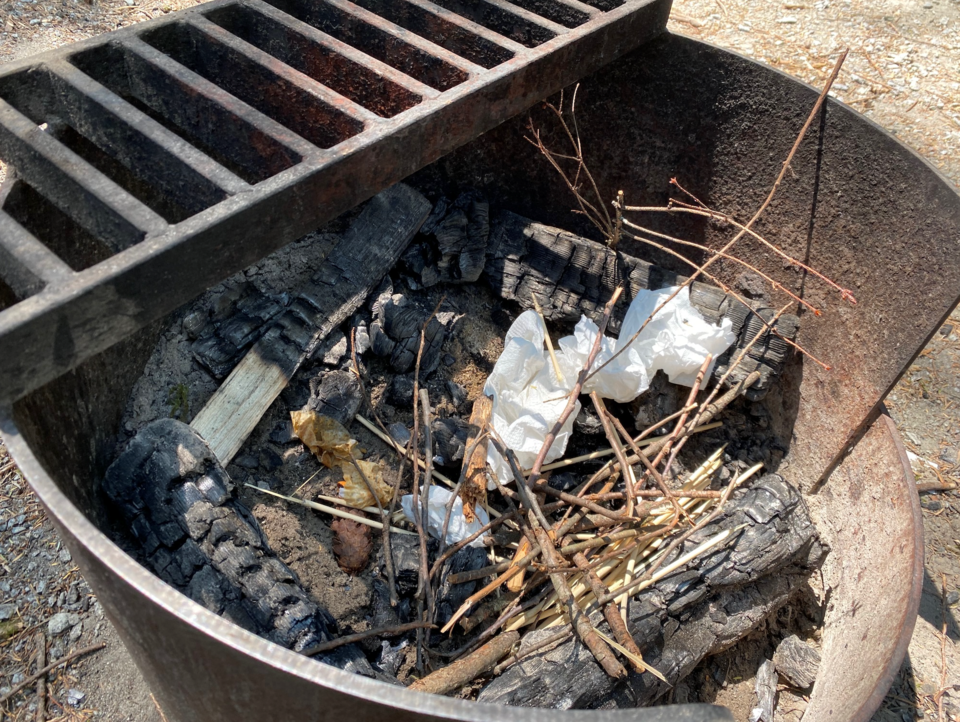On Monday, B.C. officials announced the province will now be under a blanket ban for all campfires, outside of the islands of Haida Gwaii.
“We are in a position in this province where we cannot afford to have a preventable fire occur,” said Cliff Chapman, director of wildfire operations at the BC Wildfire Service.
“If we have just one preventable fire get away and start an impactful fire, that’s going to draw resources away from wherever they currently are,” he said.
The ban means campers will be in the dark around their fire pits at popular campgrounds such as Cultus Lake Provincial Park in the Fraser Valley; or, they may rely on a propane-fuelled fire bowl to roast a marshmallow; although, this weekend, about 10 kilometres south of Cultus Lake, 90 campfires will blaze.
That’s because those fires will be allowed by Washington State Park officials at the Silver Lake campground, which affords fire pits at all of its campsites.
In fact, in much of Washington State pit campfires are permitted — although there are some parks that have campfire bans on par with nearly the entire province.
Whereas B.C. largely operates its fire ban decisions from six regional fire centres, and allows for some subregional and park-specific exceptions, Washington State operates from a much more detailed county-by-county and park-by-park perspective — although when fire risks are decidedly extreme across the state, the Department of Natural Resources will overturn any remaining jurisdictions where campfires are allowed.
Some Washington parks and counties afford greater requirements in order to continue to allow campfires on campgrounds, such as only allowing seasoned wood or charcoal and having fires contained in a small enclosure, no larger than about one metre in diameter — the size of a typical black fire pit in a BC Parks campground. Whatcom County, where Silver Lake is located, also prohibits fires when winds exceed about 15 km/h, for example.
Officials in B.C. do not differentiate between campfires — they may be a fire on a forest service road or one in a campground fire pit.
British Columbia’s campfire ban was announced by Minister of Emergency Management and Climate Readiness Bowinn Ma, who cited dry conditions across the province. On Thursday, B.C.'s 2023 wildfire season vaulted into second place in the province's all-time record for area burned.
Ma has also voiced concerns about drought conditions.
For comparison, this year, to May, Seattle, Wash. has reported less precipitation (about 13 inches, or 330 mm) than Vancouver (352 mm).
'The climate crisis is here'
Asked why the service and ministry had decided to implement a blanket ban and what accounts for the discrepancy between the province and Washington, Chapman said the decision comes down to a lack of firefighting resources.
“I understand the concern, I understand what Washington State is doing but we’re in a very challenging situation, with what’s going on in B.C,” he said.
The BC Wildfire Service reports that of the 1,046 fires in B.C. this year 334 were caused by people.
However, what’s unclear is the circumstances surrounding those fires. Neither the ministry, the wildfire service nor the BC Conservation Officer Service (COS), tasked to ticket people who cause wildfires or start illegal outdoor burns or campfires, could inform Glacier Media how many fires have started from a campfire pit inside a regulated BC Park or recreational site either this year or over the past five years.
The wildfire service has attributed the highly disruptive Cameron Lake wildfire, which closed the highway to Tofino last month, to a campfire, but was not forthcoming with the exact circumstances.
Asked whether the provincial government needs more resources deployed to wildfire services, Ma replied government has already established the BC Wildfire Service as a year-round operation and has spent record amounts on wildfire suppression in recent years.
“I think what’s clear to me is that the climate crisis is here,” said Ma.
Last year Washington State budgeted $109 million to emergency fire suppression via the Department of Natural Resources. Up north, in B.C., the provincial government allocated $199 million. Whereas B.C. has 60 million hectares of forest to manage Washington has about nine million hectares (22 million acres), according to each government.
Following 2021, one of the costliest wildfire seasons in B.C. history ($801 million), the B.C. government announced it stepped up measures to prevent future fires with $250 million in additional funding, over three years, for the BC Wildfire Service and Emergency Management BC. In April 2021, ahead of its own extreme wildfire season, Washington invested $500 million over eight years to fund wildfire preparedness and prevention efforts, Oregon Public Broadcasting reported.
Despite the campfire ban in B.C. and the continuance of them in Washington (at least for now, and in enclosed and regulated areas), the British Columbia Lodging and Campground Association takes no issue with the decision, according to its president Jamie Cox.
No members have voiced displeasure at the blanket ban, said Cox, adding “the reality is for the public to understand that fire is not a good thing.”
However, Cox said, “I’d like to drill down what are the fire starters …what is the inherent problem?
“I thoroughly think if we could get government to understand where the real risks are and bring out parameters, that would be fantastic,” said Cox.
Cox believes enforcement agencies, including the police, are stretched too thin these days to adequately enforce fire bans.
Glacier Media did not receive a callback from COS when it inquired on enforcement statistics, to date, this year.




